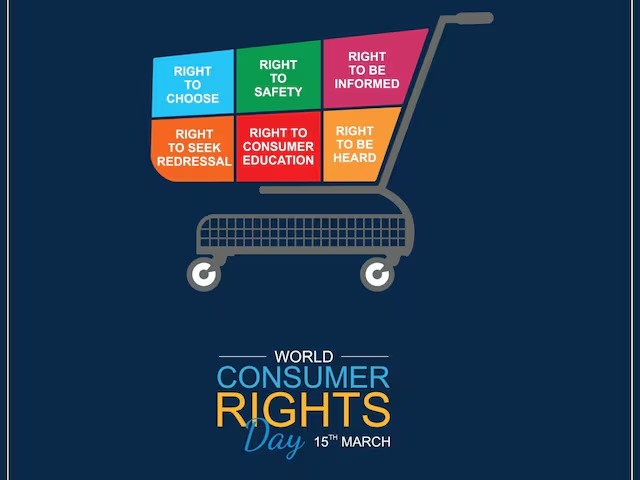World Consumer Rights Day 2024: Overview of the Event, Its History, and Six Essential Rights
Worldwide celebrations of World Consumer Rights Day take place on March 15 each year. This day, as its name implies, is meant to serve as a reminder to provide proper information about the amount, quality, potency, purity, price, and standard of the item, as well as the significance of safeguarding consumer rights. By bringing consumers’ rights and obligations in the marketplace to light, World Consumer Rights Day empowers them. It also emphasizes the need for moral and just corporate conduct, making companies responsible for protecting the rights of customers.

theme for World Consumer Rights Day in 2024
“Fair and responsible AI for consumers” is the subject that Consumers International has chosen for World Consumer Rights Day in 2024. This subject emphasizes how artificial intelligence (AI) is becoming more and more important at a rapid rate, and how urgent action is required to guarantee a just and responsible AI future in terms of consumer rights.
Thus, the purpose of World Consumer Rights Day is to draw attention to issues like invasions of privacy, incorrect information, and discriminatory behaviors, as well as how AI-driven platforms may propagate disinformation and reinforce prejudices.
History of World Consumer Rights Day (2024)
On March 15, 1962, at a speech on consumer rights before the US Congress, former US President John F. Kennedy sowed the seeds for World Consumer Rights Day. For the first time, a global authority discussed consumer rights. Since its first observance on March 15, 1983, World Consumer Rights Day has gained international recognition and endorsement from the United Nations. Numerous national and international activities have been planned to increase awareness of consumer rights.
The importance of World Consumer Rights Day in 2024
This day is commemorated to increase public knowledge of the rights that customers currently have, which may protect them from becoming victims of unfair business practices, discrimination, and exploitation. On World Consumer Rights Day, consumers are also urged to learn more about defending their rights and making sure they are equipped to take action to address grievances.
Basic Consumer Rights on World Consumer Rights Day 2024
If a consumer is unhappy with their purchase or believes they were duped into purchasing a counterfeit goods, they have legal recourse for grievance resolution. These rights aid in stopping unfair business practices and providing compensation to harmed customers. View these six fundamental consumer rights.
The right to be safe
In order to preserve their long-term interests, this right guarantees that consumers are shielded from potentially dangerous items that are on the market. Safety norms and regulations must be followed by manufacturers and retailers. In India, product quality marks include the FPO mark, AGMARK, Indian Standards Institution (ISI), and others.
The Right to Information
Customers have the right to demand accurate and comprehensible information about the goods and services they buy. To safeguard themselves against unfair business practices, they must provide information about the product’s manufacture and expiration dates, price, amount, quality, potency, purity, and any possible hazards or adverse effects.
Freedom of Choice
A customer has the right to choose whatever they want from the wide range of goods and services that are available on the market at reasonable costs.
the right to be heard
Customers are entitled to express their worries and grievances about goods or services that they are dissatisfied with. They may register concerns with the appropriate authorities, and they will be given the right forum to do so after due deliberation.
The Right to Request Redress
A customer has the right to demand payment or a fair settlement if their rights are breached.
The entitlement to receive consumer education
The buyer has an obligation to know their legal rights. Therefore, gaining relevant information and skills is part of the right to consumer education. This gives customers the ability to choose wisely and defend themselves against unethical behavior.







